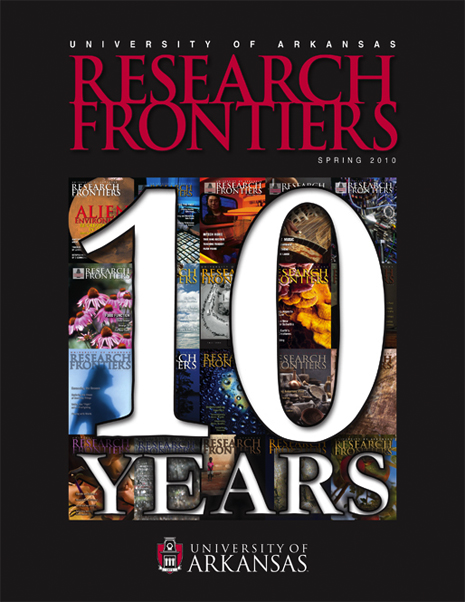FAYETTEVILLE, Ark. – Through the past decade, Research Frontiers magazine has served as a source of information on the work of faculty at the University of Arkansas, and the spring 2010 issue, which is now available in print and online, continues to bring to light the work done by professors.
“The magazine allows us to show the fascinating and cutting-edge work that our faculty do every day,” said Melissa Lutz Blouin, director of science and research communications and editor of the magazine. Research featured in past magazines has included breast cancer screening, water conservation, vaccinations, adventure tourism, children’s rights in international courts, organic orchard production, functional foods, teaching students about the Holocaust, sustainability, nanotechnology and evolutionary biology.
Although faculty research continues to inspire, many things about the magazine have changed in a decade. She points to the rise of the Internet and the various media now found on the Web as two examples of how Research Frontiers has adapted. “We now produce videos. We create slide shows. We have Twitter and RSS feeds. Using these media, we can highlight the work of even more faculty.”
The current issue of Research Frontiers features research in space and planetary sciences, which was the cover story for the first issue of the magazine in 2000. Back then, two scientists, cosmochemist Derek Sears and biological scientist Tim Kral, both studied Mars from different angles. Kral studied methanogens to see if such creatures could live under Mars-like conditions. Sears studied meteorites to learn more about planetary origins. They had started to think about creating a center for space science.
Today, the Arkansas Center for Space and Planetary Sciences, a multidisciplinary, multi-department and multi-college center, has 19 faculty members, a thriving graduate program and several planetary environmental chambers that allow the faculty to study the environments of other planets. This issue of Research Frontiers features four young faculty members and their contributions to the field.
In another feature, Kevin Fitzpatrick, sociology professor and Bernice Jones Chair in Community, and art professor Bethany Springer examine the issue of homelessness in two different ways – but both bring humanity to a subject that many people have heard about, but few people understand.
A third feature addresses health care management, an issue that will be in the forefront of health care reform. Industrial engineering professors Heather Nachtmann and Edward Pohl examine how a lack of standard language in medical supplies has led to inefficiencies in the health care system and discuss how to address the problem.
Finally, Steve Sheppard, the William H. Enfield Professor of Law, discusses his new book, I Do Solemnly Swear: The Moral Obligations of Legal Officials.
Student research has become a regular feature in the magazine, and in this issue anthropology major Amy Chancellor talks about her summer trip to Tel el-Armana in Egypt, where the spent five weeks studying the skeletons of laborers who worked to build the capital city of Armana 3,500 years ago.
Another regular feature of the magazine, Arts and Letters, features Benjamin Pierce, a professor of music and tuba player. Pierce has won more than a dozen awards for his playing. He can be heard on video at the Research Frontiers Web site.
In addition to book reviews and briefs, the UA Q&A feature asks “What makes hair go gray?” and “What is a Ponzi scheme?” The answers to these and many other questions can be found at the Research Frontiers Web site.
Contacts
Melissa Blouin, director of science and research communication
University Relations
479-575-3033,
blouin@uark.edu
